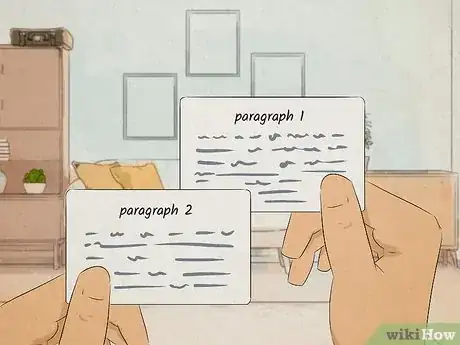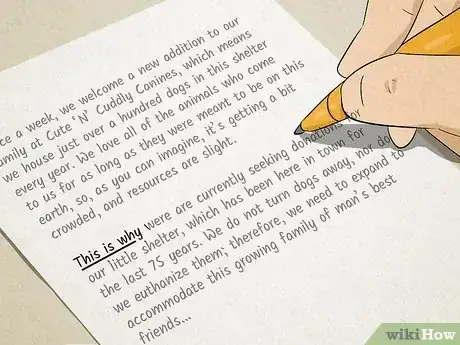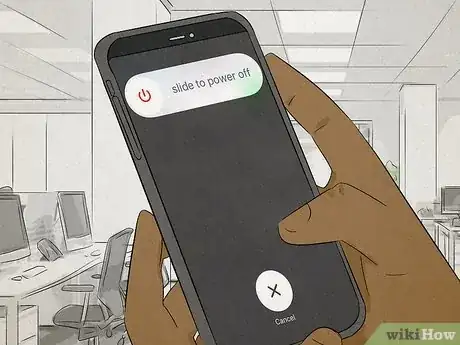This article was co-authored by wikiHow staff writer, Hannah Madden. Hannah Madden is a writer, editor, and artist currently living in Portland, Oregon. In 2018, she graduated from Portland State University with a B.S. in Environmental Studies. Hannah enjoys writing articles about conservation, sustainability, and eco-friendly products. When she isn’t writing, you can find Hannah working on hand embroidery projects and listening to music.
This article has been viewed 1,507 times.
Learn more...
Do you find yourself saying “um,” “ah,” “like,” or “you know” a lot? You’re not alone—many of us use these filler words while public speaking to avoid awkward pauses. That’s where we come in! In this article, we’ll give you the best tips to stop saying “um” and other filler words to improve your public speaking skills and sound more professional.
Things You Should Know
- Embrace 1- to 2-second pauses as you talk to avoid using filler words. Organize what you want to say logically to create natural transitions.
- Record yourself talking and then listen. Point out every time you say “um,” “like,” or “ah.” Just paying attention to your speech can help you change it.
- Practice what you want to say beforehand, and calm your nerves before you start speaking. You'll sound confident and professional in no time!
Steps
Pause instead of using filler words.
-
Embrace the silence instead of filling it all the time. Most of us use filler words like “um,” “ah,” or “you know,” to fill pauses as we talk. Instead, try allowing yourself to just be silent for 1 to 2 seconds. Use the time to gather your thoughts and plan out what you’re going to say next.[1] X Research source
- It can be tough to train yourself to do this, especially if you get nervous talking in front of others. Try to keep it at the forefront of your mind, and practice it over and over until it becomes second nature.
Organize your information into chunks.
-
Create a natural flow of content so you know what to say next. A lot of times, we rely on filler words as we plan out our next sentence. When you’re writing a speech or presentation, try to organize your information as logically as possible to avoid any awkward moments. That way, you’ll be much less likely to use a filler word as you talk.[2] X Research source
- For instance, maybe you’re giving a speech on the project that you and your team completed at work. To organize things logically, you could start with the planning phase, go into the working phase, and wrap up with the publishing phase.
- You could also tell a story of sorts. Write out a beginning, middle, and end for a logical organization tactic.
Plan out your transitions.
-
Write out what you’re going to say to move from subject to subject. Planning what you’re going to say prevents you from making anything up on the fly, which will help avoid saying “um” or “ah.” Plus, transitions help keep the audience engaged and focused. Great transition phrases to use include:[3] X Research source
- “Now, let’s move on to…”
- “Now I want to talk about…”
- “Let’s transition into talking about…”
Keep your sentences short.
-
Wordy sentences may make you rely on filler words more. In general, try to keep each sentence in a speech or presentation between 15 and 20 words.[4] X Research source The shorter your sentences are, the tighter your speech will sound, which will help you avoid saying “um.”
- Plus, short and snappy sentences keep your audience more engaged, which is a great public speaking technique.
Make direct eye contact with someone.
-
When you're engaged with someone, you're less likely to say “um.” As you talk, try to pick out someone in the audience, and hold their gaze as long as you can. You might just find that this trick stops you from saying “um” or “ah” as you collect your thoughts.[5] X Research source
- If you’re giving a presentation online, try making eye contact with someone via your webcam.
Ask a friend to listen to you talk.
-
Have a friend or colleague point out every time you say “um.” It can be hard to notice when you’re using filler words on your own. Practice what you want to say out loud, and have someone clap or snap their fingers every time you say “um” or “you know.” The more you notice it, the more likely you are to stop saying it.[6] X Research source
- You can use the same trick to stop saying “like,” too.
Record yourself talking.
-
Listen to a recording of yourself to see how often you use filler words. You might not be able to catch yourself saying them in the moment, which is why a recording can help. Listen to yourself talk, and write down specific areas where you use filler words the most. Then, write down what you want to say during that part of the speech to avoid saying “um,” “like,” or “ah.”[7] X Research source
- After you record and listen to yourself once, try your speech again on a second recording. Listen to yourself and spot the differences between your first and second try. Chances are, you’ll notice improvement right away!
Practice what you want to say beforehand.
-
Knowing what you want to say will help to avoid filler words. The more you practice a speech or presentation, the more you’ll avoid stumbling over your words. Write out an outline of what you want to say to plan your speech ahead of time.[8] X Research source
- Try keeping an outline of your speech with you whenever it’s time for you to talk. That way, you can glance at it for a quick reminder whenever you need to.
Relax your nerves.
-
If you're calm and relaxed, you'll use fewer filler words. Public speaking can be nerve-wracking, and many people feel stressed before giving a speech or presentation. Do some deep breathing exercises to calm your nerves, and focus on the message of your speech instead of how people are perceiving you.[9] X Research source
- While you talk, try to focus on one person in the room. Speak directly to them to avoid thinking about the crowd.
Eliminate distractions.
-
Stay focused on what you're saying. A ringing phone or a pinging computer might make you pause and use a filler word. Silence your cell phone and any notifications before you start talking.[10] X Research source
- This is especially important when giving a presentation online. Getting a Slack or Teams message can be very distracting, so set yourself as “away” before you start.
Keep practicing.
-
Avoiding filler words can take time, so keep at it. You probably won’t eliminate all the “ums” from your vocabulary on your first try, and that’s okay! Aim for improvement, not perfection, to reach your goal.[11] X Research source
- Using a few filler words as you talk actually makes your speech seem more natural and less stiff. Experts recommend removing 90% of the filler words from your vocabulary, but leaving in the 10% to make you more relatable.
You Might Also Like

 How to React When Someone Blocks You
How to React When Someone Blocks You
 What Does X Mean when Texting? From Warm Wishes to Playful Kisses
What Does X Mean when Texting? From Warm Wishes to Playful Kisses
 13 Telltale Signs Someone Doesn't Respect You
13 Telltale Signs Someone Doesn't Respect You

 What to Say When Someone’s Mom Dies
What to Say When Someone’s Mom Dies


 How to Invite a Girl over to Your House (Move a Date to Your Place)
How to Invite a Girl over to Your House (Move a Date to Your Place)




References
- ↑ https://www.nytimes.com/2017/02/24/us/verbal-ticks-like-um.html
- ↑ https://career.uconn.edu/blog/2016/11/04/learn-how-to-stop-using-filler-words/
- ↑ https://career.uconn.edu/blog/2016/11/04/learn-how-to-stop-using-filler-words/
- ↑ http://www.plainenglish.co.uk/how-to-write-in-plain-english.html
- ↑ https://career.uconn.edu/blog/2016/11/04/learn-how-to-stop-using-filler-words/
- ↑ https://www.bbc.com/worklife/article/20160615-the-secret-to-stopping-your-ummms
- ↑ https://www.onlinecollege.org/how-to-stop-saying-like-and-sound-smarter/
- ↑ https://www.instituteofpublicspeaking.com/10-ways-to-eliminate-filler-words/
- ↑ https://www.instituteofpublicspeaking.com/10-ways-to-eliminate-filler-words/
About This Article



















































